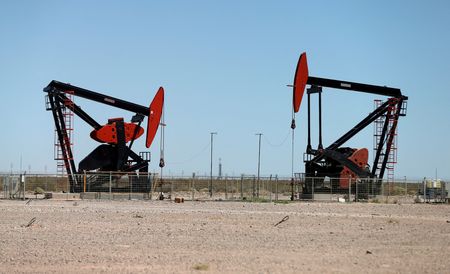By Stephanie Kelly
NEW YORK (Reuters) -Oil prices rose about 1% on Tuesday after top exporter Saudi Arabia said OPEC+ was sticking with output cuts and could take further steps to balance the market.
However, prices pared gains late in the session after Bloomberg reported that the European Union watered down its latest sanctions proposal for a price cap on Russia’s oil exports by delaying its full implementation and softening key shipping provisions.
The bloc proposed adding a 45-day transition to the introduction of the cap, according to Bloomberg.
On Dec. 5, a European Union ban on Russian crude imports is set to start, as is a G7 plan that will allow shipping services providers to help to export Russian oil, but only at enforced low prices.
“The price cap is turning out to be an enabling device for western countries to keep Russian crude on the market,” said John Kilduff, partner at Again Capital LLC in New York. “The big crux of this market has been whether or not we will lose meaningful amounts of crude and refined products from Russia and that still has not happened.”
Brent crude rose 91 cents, or 1%, to settle at$88.36. U.S. West Texas Intermediate (WTI) crude was up 91 cents, or 1.1%, at $80.95.
Supporting prices throughout the session, Saudi Arabian Energy Minister Prince Abdulaziz bin Salman on Monday was quoted by state news agency SPA as denying a Wall Street Journal report that sent prices plunging by more than 5%, saying the Organization of the Petroleum Exporting Countries was considering boosting output.
The United Arab Emirates, another big OPEC producer, denied it was holding talks on changing the latest OPEC+ agreement, while Kuwait said there were no such talks. Algeria said an “improbable” revision of the OPEC+ agreement was not discussed.
OPEC, Russia and other allies, known as OPEC+, meet on Dec. 4.
Concerns over oil demand in the face of the U.S. Federal Reserve’s interest rate hikes and China’s strict COVID lockdown policies also tempered prices.
Beijing shut parks, shopping malls and museums on Tuesday and more Chinese cities resumed mass COVID testing. The Chinese capital on Monday warned that it is facing its most severe challenge of the pandemic and tightened rules for entering the city.
Analysts now are cutting forecasts for China’s year-end oil demand.
In focus later will be the latest weekly snapshots of supply in the United States, which are expected to show crude inventories fell by 2.2 million barrels. The American Petroleum Institute’s report is due at 2130 GMT. [EIA/S]
(Reporting by Stephanie Kelly; additional reporting by Alex Lawler, Laura Sanicola and Isabel Kua; Editing by Marguerita Choy, Jane Merriman, David Gregorio and Cynthia Osterman)

